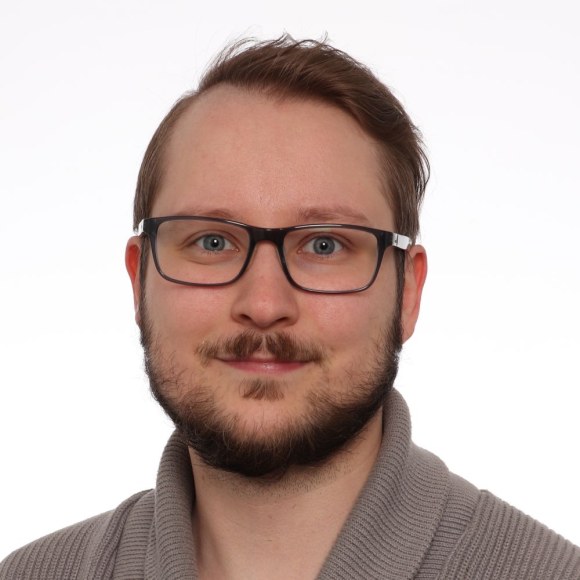
How do transnational knowledge networks frame and construct Finnish higher education policymaking?
The main objective of the Transnational Knowledge Networks in Higher Education Policymaking research project is to study how Finnish higher education policymaking operates in the European framework. We map the role of transnational knowledge networks, analyse the flow and selection of knowledge in these networks, and study the soft power they produce. The research combines network analysis, interviews, and observations. The network analysis maps the actors working in and between Finland and the EU and their relations, and the aim is to map and understand the creation, selection, and uses of knowledge in this network through interviews and observations, as well as the transformation of knowledge as it passes through the network.
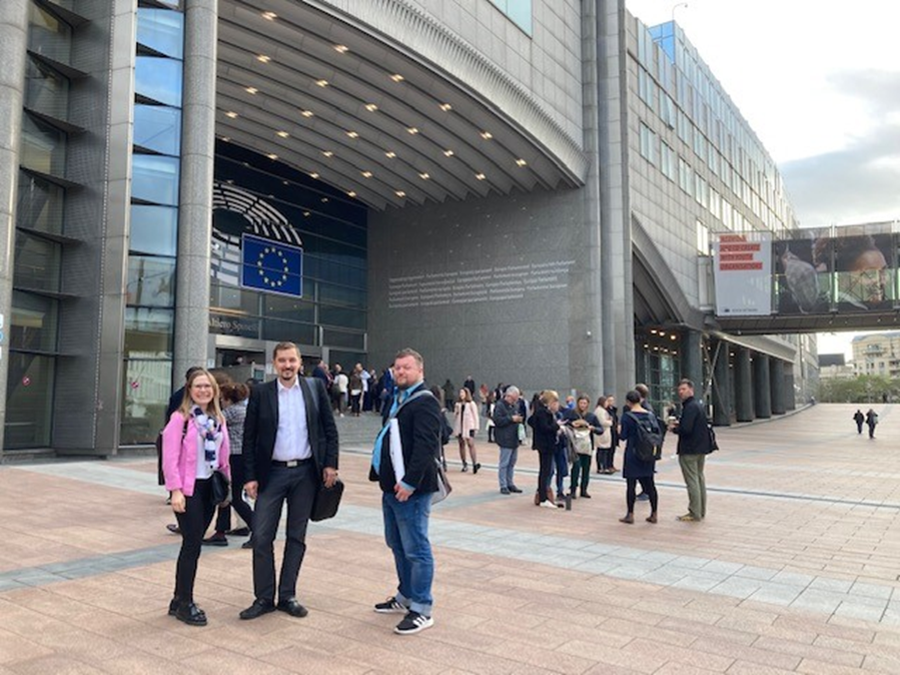
Knowledge networks
Researchers have a growing interest in analysing knowledge’s use in education policies (Fenwick et al. 2014; Carvalho 2013) and expert networks’ creation of the infrastructure for dataflows (Lawn and Segerholm 2011; Menashy 2019). Knowledge networks are identified as important, but remain mainly uncharted in education research (Normand 2016). The focus of previous European scholarly work has been on formal governing processes and Europeanisation discourses (Lawn & Grek 2012; Ozga et al. 2011). Research has identified the existence of knowledge networks in education but there is still work do be done to understand how they channel and formulate knowledge (cf. Menashy 2019).
The concept of knowledge has not been clearly defined in literature on education policy studies. Following Foucault (1977, 1986), we understand the concepts of knowledge and power as interwoven and relativistic that are always bounded by the context. We recognize policymakers not only as users, but also as producers of knowledge who draw on different formal and informal practices and networks in policymaking (Foucault 1986). More specifically, we focus on capturing “the movement of knowledge through the world of policy” (Freeman & Sturdy 2014, 14). That is, the use of knowledge in the work of policy and how knowledge practices are legitimised through networks.
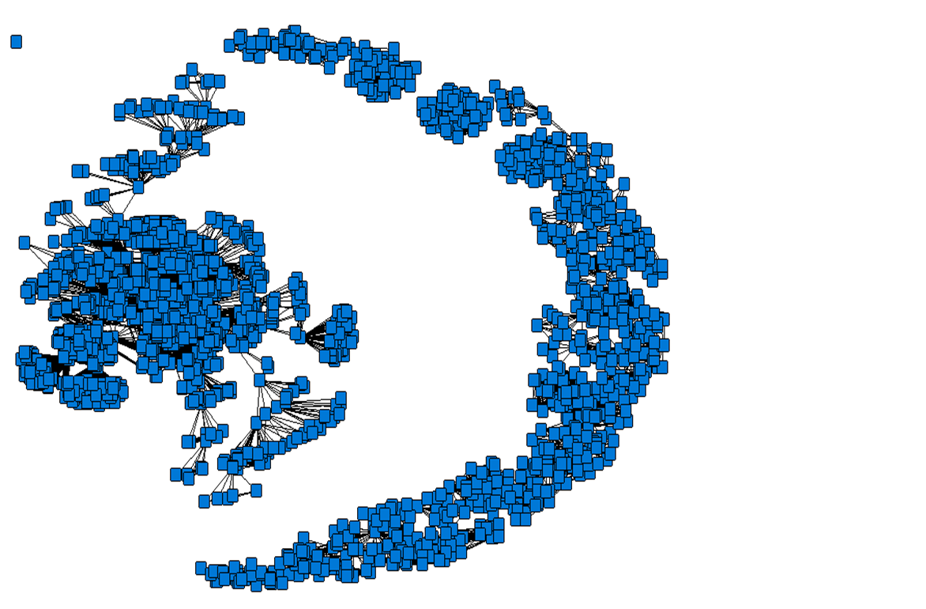
Data
This research project combines social network analysis (SNA), interviews and observations:
- The quantitative network data was collected from public documents and government public register. First set of data contains information of current working groups and organisations in Finland and the EU. The second set of data contains information about the working groups of the Ministry of Education and Culture in Finland and their members in 2010–2021.
- The interview data covers networks of key higher education policy actors connecting the Finnish and EU contexts. Close to 50 interviews were conducted in Finland and Brussels, Belgium.
- The observation material consists of data collected in meetings of Finnish ministerial working groups and the Committee on Culture and Education in the European Parliament.
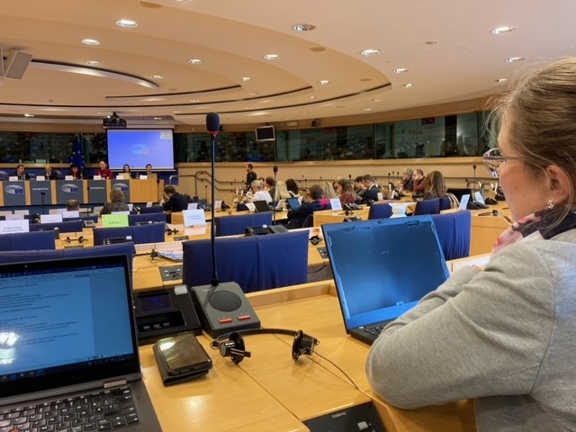
Emerging themes
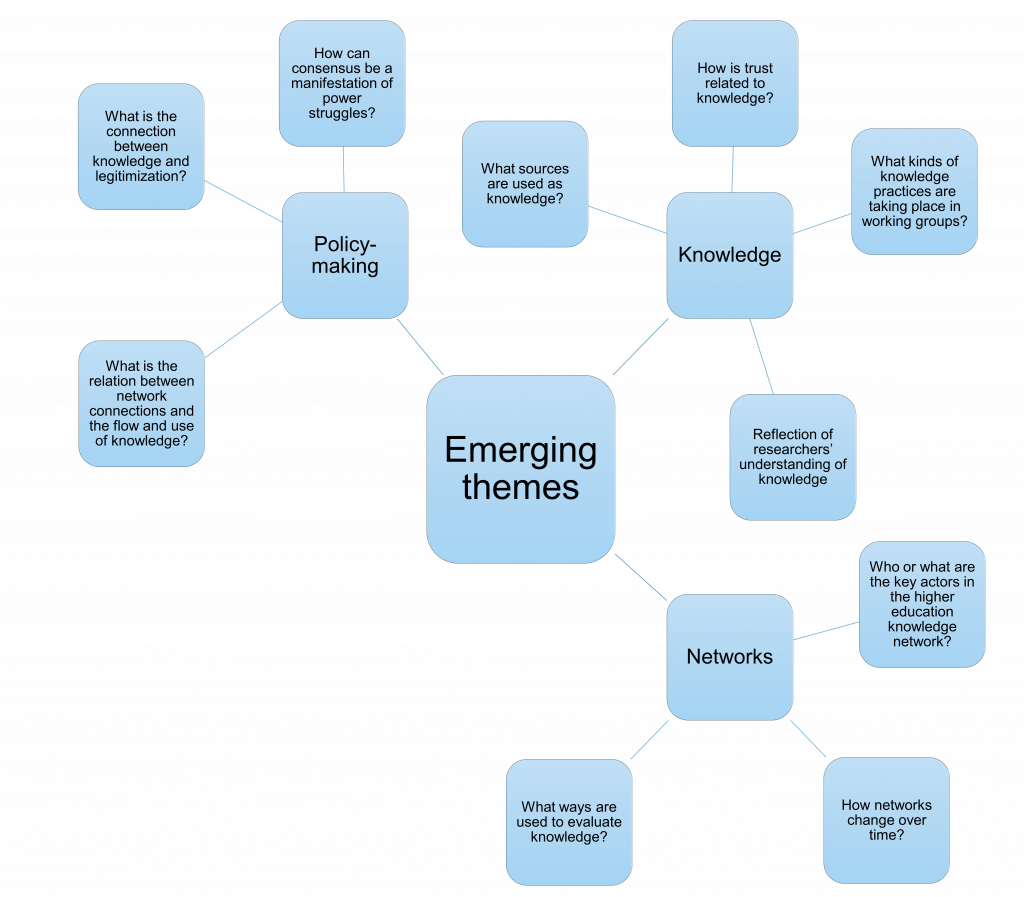
Research aims
Our research analyses the concrete operation of transnational knowledge networks in higher education in the context of Finland and the EU. These networks are cross-sectoral entities, formed in formal and informal relationships between policy actors and their affiliated groups.
The project’s premise is the social construction of knowledge in networks. The project is guided by previous research on power and knowledge, using a convergent mixed-method design to work on three aims:
- Relationality of knowledge: Using network analysis, we will map knowledge network members and their relations with Finnish–EU higher education networks.
- Normative selection of knowledge in the policy process: We will conduct and analyse interviews with policy actors identified in the network analysis as central.
- Soft power of transnational networks: We will analyse how knowledge is translated, shaped, and used in these networks’ policymaking, drawing on observation data collected from key meetings and public events.
References
- Carvalho, L.M. (2013). The Fabrications and Travels of a Knowledge-Policy Instrument. European Educational Research Journal, 11(2), 172-188.
- Fenwick, Tara, Eric Mangez, and Jenny Ozga. (2014). Governing Knowledge: Comparison, Knowledge-Based Technologies and Expertise in the Regulation of Education. London: Routledge, 2014.
- Foucault, M. (1977). Discipline and Punish: The Birth of the Prison. London: Allen Lane.
- Foucault, M. (1986). Truth and Power. In Gordon C, ed, Michel Foucault. Power/knowledge. Harvester.
Freeman, R. & Sturdy, S. (2014) Knowledge in Policy. Bristol: Policy Press - Lawn, M. & Grek, S. (2012) Europeanizing education : governing a new policy space. Oxford: Symposium Books.
- Lawn, M. and Segerholm, C. (2011). Europe through experts and technologies. In Fabricating Quality in Education: Data and Governance in Europe, Jenny Ozga, Peter Dahler-Larsen, Christina Segerholm and Hannu Simola (eds.), 32–46. London: Routledge.
- Menashy, F. (2019). International Aid to Education. New York: Teachers College
Normand, R. (2016) The Changing epistemic governance of European Education: The fabrication of the Homo Academicus Europeanus?Cham: Springer. - Ozga, J. (2011) Fabricating quality in education: data and governance in Europe. London: Routledge.
_ _ _
The project is funded by the Research Council of Finland. Follow us on X: @KnetsT
You can find the privacy notice of the project in english here: Privacy notice
Tutkimusprojektin tietosuojailmoituksen pääset lukemaan suomeksi täältä: Tietosuojailmoitus


